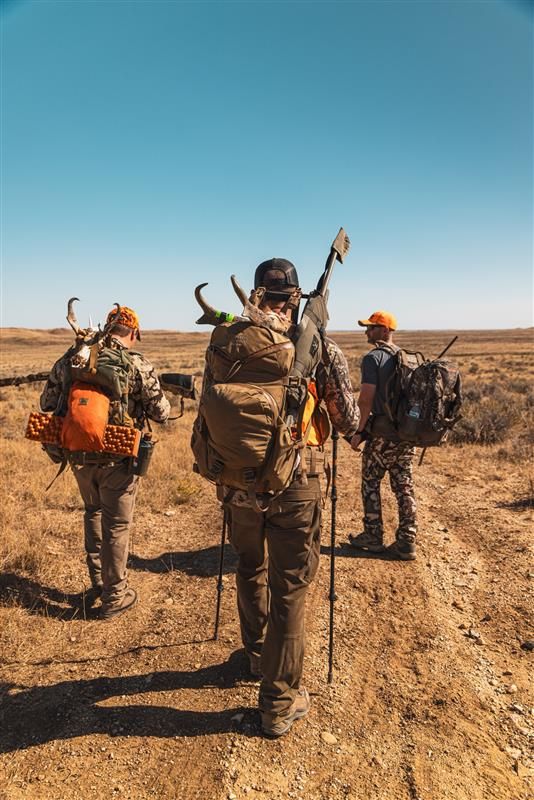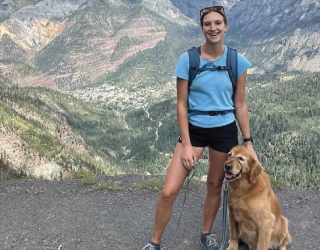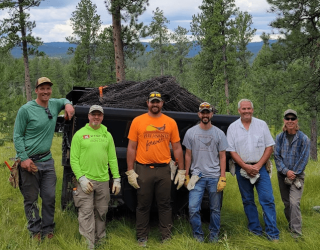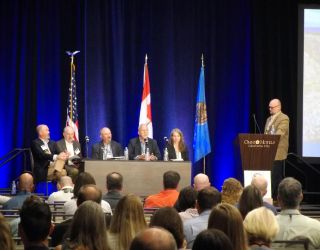
New Years Resolutions
Mentor a new hunter this year.
Happy 2025, everyone. Now is the time of year when we are all thinking of how we can best spend this new year. What mistakes did we make last year that we can avoid this year, or what might we do differently to better impact our lives and the lives of those we care about.
While there are many things we can all work on, consider taking a new hunter afield this season. Mentoring a new hunter can be one of the most incredible things you can do for conservation. The North American Model of Wildlife Conservation depends upon the engagement and care of hunters and anglers who care about the resource. Making a new hunter who understands the basics of conservation management in this country and enjoys their time afield is a great way to ensure that our natural resources are here for generations.
Below are a few tips and tricks for mentoring a new hunter to help you plan your 2025 hunting seasons.
How to mentor a new hunter:
Mentoring a new hunter can seem both simple and daunting. For those of us who hunt all the time and feel as if we know the ins and outs of this lifestyle, we can overcomplicate our lessons. For those of us who hunt every year but not as often as we once did, we can struggle to include enough information to stay relevant.
The one thing to remember above all else is this: No matter how difficult an undertaking this may seem, don’t let fear of failure deter you. As long as the person you are mentoring has a positive experience outdoors, you have done your job. You don’t need to teach them everything all at once, and you don’t need to fill a tag. You just need to keep them smiling.
Before the Hunt:
Planning: Like most things in life, planning is essential to ensuring your mentee has a positive experience. This is also a great opportunity to include your mentee in the planning process. While this may seem tedious, understanding the full scope of hunting means having a basic understanding of developing a plan. Bring your mentee along on scouting trips and explain what you are looking for. Consider buying them an OnX membership and sharing some pins in the months and weeks before your hunt so they understand the tools available to a new hunter.
Licenses: Another key point to walk a new hunter through is the licensing and tag draw options and process. Depending on your state and the game being pursued, this can get quite complex. While multiple videos and resources are available to help a new hunter understand these websites and points systems, the best way to learn is often by simply sitting down with someone who knows how it works while they teach.
Picking a game animal to hunt: I am admittedly biased, as many of us are based on our first hunting experiences, so feel free to trust your gut if it tells you something different. The best first hunts for adults are wild hog or turkey hunts, while the best first hunts for youths are duck, quail, or dove hunts.
Youth: I focus on small game for youth hunters. Depending on age, physical ability, and maturity, it can be easier for younger hunters to stay safe and enjoy themselves in a more social hunting style. Putting a child in a duck blind or boat with a few adults allows them to gain the experience of a few different mentors while helping keep boredom at bay through social conversation. A dove field or quail hunt can accomplish many of these same deliverables. It’s also worth noting that with kids, anytime you can involve a dog in the mix, it can make having a good experience much more manageable.
For adult new hunters: I prefer to take folks on turkey or wild hog hunts. You can certainly take an adult duck or quail hunting and gain many of the same positive interactions and experiences as you can with a youth hunter. However, with an adult hunter, I am less worried about boredom than I am with youth hunters. I find that adults take coaching better than potentially being embarrassed in front of a group. I like wild hogs and turkeys because they are both relatively forgiving hunts with less complex shooting assignments, giving mentees a better chance of success. Once you have found success, the meat is also something most adults have had experience with in the kitchen, and the likelihood that they will utilize all the meat is high.
You will undoubtedly notice I did not say mule deer or black-tailed deer hunts. Don’t let this deter you from taking someone on a deer hunt. Just ensure you incorporate the desired lessons into whichever species you pursue.
Gear: It is worth mentioning that most new hunters will need some additional gear before you pick them up for their first hunt. Talk about what gear you are bringing and what gear the new hunter should have ready for themselves before you are at the trailhead. You don’t want to over-burden your mentee with a laundry list of needs, but you want to ensure they are comfortable and prepared to be in the field.
During the hunt:
The biggest thing to remember during the hunt is that you are not a guide. You are not there to take someone out to find success. You are there to teach the mentee how to find success in the future without you.
Involve your mentee in the process: Avoid making declarative statements like, “We are going up this hill” or “The animals are over here.” Walk the mentee through your thought process and how you arrive at a decision, or better yet, explain the details of the situation and let your mentee decide. Ask them, “Should we set up under this tree or over there” for a morning turkey hunt, then explain why you agree or disagree.
Talk about Conservation: One thing many mentors miss is the opportunity to talk about conservation. This doesn’t have to be a doctorate-level dissertation on CWD or public policy. It can be a simple instruction on why you each had to buy a $25 duck stamp to hunt today, how all the money from the duck stamp goes to making more waterfowl habitat, and how, since the duck stamp, the waterfowl population has rebounded, exponentially since the 1930s. You could talk about a local invasive species like cheatgrass and how it causes poor deer nutrition, meaning fewer deer are in an area. If you are unsure what to teach, grab a recent article from the MDF or BDF websites to read and summarize. You don’t need to make your mentee an expert on anything as long as they know their hunting license dollars help wildlife; that is enough.
Be ready to fail: Inevitably, in your new hunter’s life, they will fail in the field. It’s better if they fail first with you so you can walk them through what happened. Be ready to explain why a shot was missed or what the two of you could have done differently, and stay positive. Even when the situation looks like you won’t fill that tag, it’s your job as the mentor to keep morale up and keep your mentee excited about the next opportunity.
After the hunt:
Congratulations: If you are successful, make sure to congratulate your new hunter. Say things like, “This deer is a real accomplishment, and you should feel great about all the work you put in to get here.” Don’t say things like, “I got you/them/he/she their first deer.” You want to take all the success of the hunt and put it on your mentor, giving them credit. This isn’t about you being the greatest mentor in the world. It’s about them finding success.
Own the mistakes: When mistakes are made, you own them as the mentor. Talk openly about things you would do differently next time, and let your mentee see your learning process and how you adjust for the next trip or season.
Teach about table fair: Take this opportunity to teach your mentee about turning their new duck, buck, turkey, andboar into meals for their family and friends. Offer them a recipe or two and be available to help them cook it for the first time.
Make a plan to do this again: Whether you are successful or not, plan to try again the next weekend or the next season. Few things in life are a one-and-done deal. Hunting is no different. You don’t want your mentee to say in ten years, “I went hunting once, and it was great.” You want them to say in ten years, ” My first time hunting was great; I learned so much from _________ I haven’t missed a turkey season since.”
Conclusion
Hopefully, you learned enough from this to feel confident about taking a new hunter afield this season. Remember, we all have something to teach and offer the next generation of hunters and anglers.
Good Luck!
As always, good luck this winter and remember to send any success pictures or stories from the field to web@muledeer.org and you could be featured on our website or in our magazine. If this article or any of our articles have helped you become a better hunter or conservation steward, consider becoming a member of the Mule Deer Foundation and Blacktail Deer Foundation.


